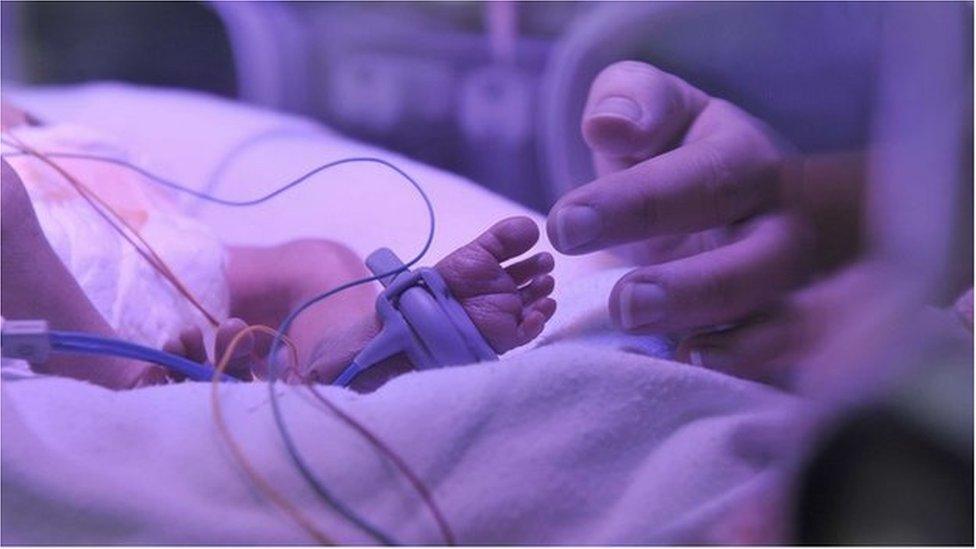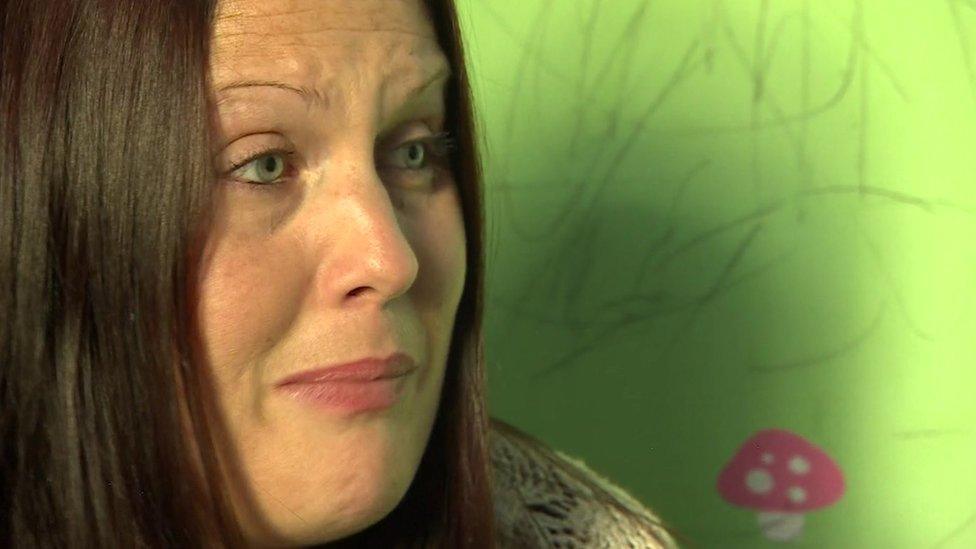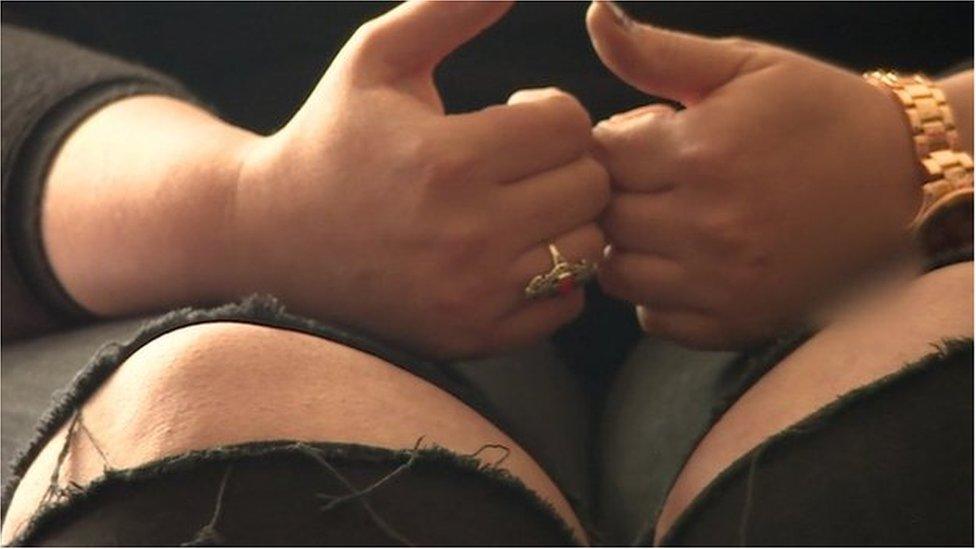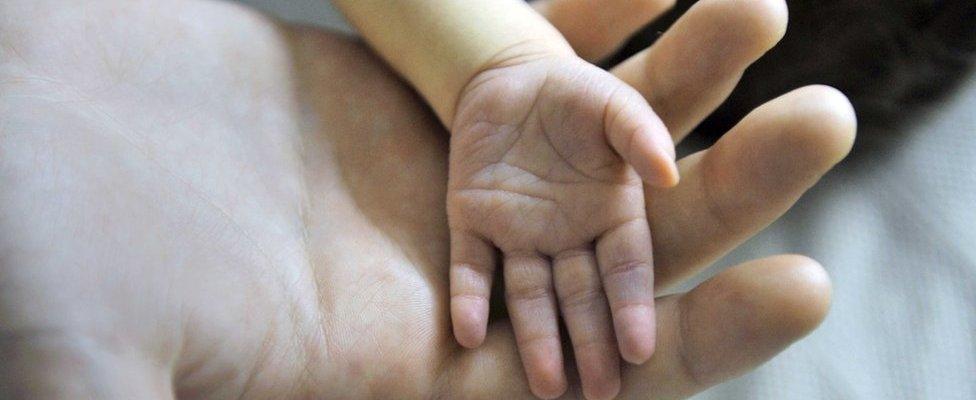Born addicts: The babies starting life in rehab
- Published

Hundreds of babies in the UK are born suffering the effects of drug withdrawal because of their mother's addiction, but one facility is working to keep the newborns together with their parent while they detox.
"You know you are carrying a baby and it's the wrong thing to do, but you still do it."
'Rachel' was addicted to heroin throughout her pregnancy.
After suffering domestic abuse for 10 years, she says she was forced into prostitution which led to drug addiction.
"It's a lifestyle. Then one day you wake up and realise you have a habit.
"I feel guilty every day of my life, and that guilt will stay with me."
Rachel is one of the many mothers who has given birth to a drug-dependent baby.
According to NHS figures, 1,087 babies in England were affected by maternal use of drugs in 2014-15, while in Scotland 987 babies were affected between 2012-15. In Wales 75 babies were affected by drugs and alcohol in 2015-16.
Almost every drug passes from the mother to her foetus's blood stream during pregnancy so babies enter the world addicted and suffering the effects of withdrawal - known as Neonatal Abstinence Syndrome (NAS).

Emma gave birth to twins while she was trying to kick her heroin addiction
Uncontrollable trembling, high-pitch crying and blotchy skin are common symptoms in newborns addicted to opioids such as heroin and methadone.
In many cases a child like Rachel's would be given to a family member or taken into care, but some experts believe the outcomes for children and their mums are much better if they are allowed to detox together.
The Plymouth-based charity Trevi House provides this service and gave the BBC exclusive access.
The women living in the centre insist they stand a better chance of detoxing whilst staying with their babies.
'Louise', who became addicted to heroin in her teenage years, had her first children taken into care.
"I just wanted to kill myself when they were taken away," she says. "I did attempt numerous times."
She says she can only stick to the detox program because she has her son by her side.
Trevi House resident Louise: "To have my son still with me is quite amazing."
"To have him with me is amazing. They tried to take him from birth."
Emma completed the rehab program last year, which meant she kept custody of her twins.
"It's actually heartbreaking that so many women like me are just written off: 'oh well, you're a drug addict so you can't have your child'," she says.
"Something has got to change.
"The women who I have met in this place were phenomenal. Some of the stories I've heard, some of the things some of these women have been through you wouldn't imagine it in your darkest nightmare.
"They didn't deserve that. People deserve a chance, they deserve help and their children deserve it".
Now in recovery she was offered housing in a nearby community.

Rachel says she feels guilty about what she put her baby through every day and will never forgive herself
Between December 2013 and December 2015, 65% of children left the programme in the care of their mother, who was drug and alcohol free.
But despite this, some experts believe removing a mother and child from the community does not solve the problem.
There are concerns the site does not project real life and mothers returning to the community could relapse after becoming accustomed to 24-hour care.
Hannah Shead, chief executive of Trevi House disagrees.
"Every mother here says she wouldn't be able to do recovery without her child. She wouldn't be able to focus on what she needed to do.
"And for the child to be separated; they would either be in the care system, they might be with family members but they would not be with their mums.
"So keeping them together is better for mother and the child."
With just a few months to go until she has completed the rehabilitation program, Rachel says she is looking forward to a life without drugs and abuse.
"I don't blame partners, I don't blame anybody for what happened to me. I have to take responsibility for it because it was my choice to take drugs.
"I will never forgive myself but I'm using that guilt for strength, because living in past would put me back to square one."

How the rehab program works

Trevi House opened in 1993. It can take up to 10 women at a time, who are not allowed to leave unsupervised.
Each mother follows a strict rehabilitation plan which includes daily counselling sessions, group meetings, medical examinations and check-ups from social services.
It costs £1,500 per week to send a mother and baby to the centre.
Funding for placements is often via joint arrangements between adult addiction and children's social care services.
There are other residential rehabilitation options available in the UK as well as services in the community.
